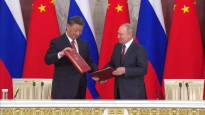Vladimir Putin hosted Xi Jinping’s visit to Moscow. Will anything new emerge from the dreaded arms deals? What was discussed about Ukraine or what was the message to Western countries – we collected the answers to five questions.
The presidents of Russia and China talked in the afternoon in the Kremlin. Our Russian correspondent Heikki Heiskanen commented on the meeting freshly together with our Asian correspondent Kirsi Crowley with.
1. Did you find out if China is going to arm Russia?
– At least not in public speech. They said that China is not a military partner, Crowley sums up.
– Russia has previously been an important arms importer for China. No major arms deals were expected to be announced. China has not wanted to go too far in supporting Russia. So what is the reality behind the scenes. There have been warnings about it, but even the West has not presented evidence that an arms trade has taken place, Heiskanen reflects.
2. The Chinese president said that Russia is committed to returning to the peace talks in Ukraine. Is this just talk, or could there be some hope to cling to?
– Just a talking point. Again, China’s views that sanctions are not useful were repeated. There was no practical proposal on how to build peace. And China still refuses to condemn the Russian attack, Crowley reminds.
– Putin said that Russia respects China’s peace program, but almost in the same breath he stated that others are not ready to move. So nothing can be expected right away. We don’t know what was really discussed behind the scenes, says Heiskanen.
3. Was it possible to conclude from the meeting how great friends or even allies the countries really are?
– They said that relations are at their highest ever. This is a practical alliance and partnership that both need. China needs Russia in the race against the West, and Russia needs China in relation to Ukraine, Crowley estimates.
– Perhaps too much emphasis is placed on such an image of what the meetings look like. Russia tries to present that China and Russia are equal partners and share a common picture of how the world order should work. The direction that is viewed with gloom is the collective West, says Heiskanen.
4. One of the messages from the negotiations was that economic cooperation will be intensified and more gas and oil will be exported to China. How big is the trade between the countries now?
– Last year, trade between the countries grew by 30 percent. Russia sells oil and gas cheaper and more. The trade seems to be growing even more. Still, the countries’ trade is still small compared to China’s trade with Europe or the United States, Crowley says.
– China is certainly careful that Russian trade does not lead to Chinese companies being subject to Western sanctions, Heiskanen adds.
5. As a final summary of the meeting: did anything really interesting happen?
– There was nothing terribly new. China’s support is trade and condemnation of Russian sanctions. The visit itself is, of course, a significant demonstration of support for Russia. The key thing was that it happened and Putin was able to show that relations with China are very warm, Heiskanen analyzed.
– Agree. From China’s point of view, much of it was the same message that China has been delivering for a long time. We talk about a multipolar world where China is a peacemaker, the reasons are pushed to the United States, Crowley concludes.
